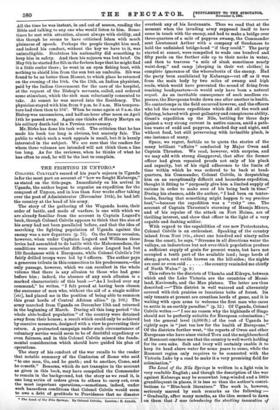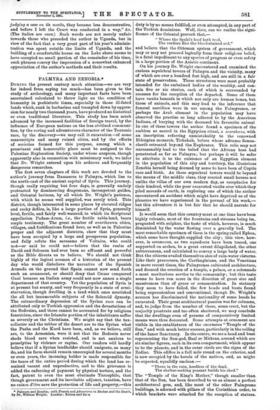THE FIGHTING IN 17NYOR0. 40 COLONEL COLVILE'S record of his year's
sojourn in Uganda is for the most part an account of " how we fought ICabarega," as stated on the title-page. Immediately on his arrival in Uganda, the author began to organise an expedition for the conquest of Unyoro, and in less than four weeks after taking over the post of Administrator (November 16th), he had left the country at the head of his army.
The story of the gathering of the Waganda hosts, their order of battle, and mode of warfare, is one with which we are already familiar from the account in Captain Lugard's book, though Colonel Colvile appears to think that the size of his army had not been paralleled before, and that the idea of marching the fighting population of Uganda against the enemy was a new departure (p. 73). On the former occasion, however, when under Captains Lugard and Williams these levies had assembled to do battle with the Mahommedans, the conditions were somewhat different, since Lugard had but 139 Soudanese with 4 Europeans, while Colonel Colvile's 700 fairly drilled troops were led by 8 officers. The author pays a generous tribute in this connection to his predecessors,—the only passage, however, which we can recollect in the whole volume that there is any allusion to those who had gone before him ; indeed, the absence of any such allusion is a marked characteristic of this book :—" As I looked over my command," he writes, "I felt proud at having been chosen the successor of men who, without the aid of a single soldier [sic], had placed me in the position of being able to summon this great horde of Central African allies." (p. 106.) The army marched from Uganda on December 13th and returned in the beginning of March. During all this long period "the whole able-bodied population" of the country were detained away from their homes; a result which could only be achieved by coercive measures, designed with a view to preventing their return. A protracted campaign under such circumstances of voluntary service would seem to be of doubtful expediency or even fairness, and in this Colonel Colvile missed the funda- mental consideration which should have guided his plan of operations.
The story of his conduct of the war recalls to the reader that notable summary of the Centurion of Rome who said "to one man, Go, and he goeth ; and to another, Come, and he cometh." Reasons, which do not transpire in the account as given in this book, may have compelled the Commander to remain in the background, but the story as we read it, is one long series of orders given to others to carry out, even the most important operations,—sometimes, indeed, under such hazardous conditions that Colonel Colvile would seem to owe a debt of gratitude to Providence that no disaster
' The Land of the Nile Springs. By Colonel Colvile, London: E. Arnold.
overtook any of his lieutenants. Thus we read that at the moment when the invading army supposed itself to have come in touch with the enemy, and had to make a bridge over three-quarters of a mile of papyrus swamp, the Commander sent Lieutenant Arthur with a company of Soudanese to hold the unfinished bridge-head "if they could." The party started at sunset, were compelled to wade one hundred and fifty yards on the further side up to their necks in water, and then to traverse "a mile of slush sometimes nearly waist-deep," and camp [sleeping in their wet clothes] in complete ignorance of the whereabouts of the enemy. Had the party been annihilated by Kabarega—cut off as it was from the main body by two miles of swamp and high reeds, which would have prevented the sound of firing from reaching headquarters—it would only have been a natural sequel. As an inevitable consequence of such needless ex- posure, the Europeans broke down one after another in health. No contretemps in the field occurred however, and the officers who led the various expeditions which did all the work and fighting, behaved with great gallantry and conspicuous ability. Grant's expedition up the Nile, battling for three days against a very strong current in native canoes, amid a path- less waste of sndd and papyrus, attacked day and night, and without food, but still persevering with invincible pluck, is one instance of many.
Space, we regret, forbids us to quote the stories of the many brilliant " affairs " conducted by Major Owen and Captain Thruston. We read, however, with surprise, and we may add with strong disapproval, that after the former officer had given repeated proofs not only of his pluck and capacity, but of his rigid adherence to the limits of time within which he was ordered to be back at head- quarters, his Commander, Colonel Colvile, in despatching him on an exceptionally difficult and hazardous expedition, thought it fitting to " purposely give him a limited supply of rations in order to make sure of his being back in time." During his absence, adds the author, " I had been on tenter- hooks, fearing that something might happen to my precious boat,"—because the expedition was a " risky " one. The account of Captain Thruston's storming of Masaja Mkuru, and of his repulse of the attack on Fort Hoima, are of thrilling interest, and show that officer in the light of a very capable and dashing soldier.
With regard to the capabilities of our new Protectorates, Colonel Colvile is an enthusiast. Speaking of the country inland from Nzoi (viz., about one hundred and ninety miles from the coast), he says, " Streams in all directions water the valleys, an industrious but not over-thick population produce a sufficient supply of grain for present wants, but have not occupied a tenth part of the available land ; large herds of sheep, goats, and cattle browse on the hill-sides ; the nights are cool or even cold the country reminded me chiefly of North Wales." (p. 8.) This refers to the districts of Tikamba and Kikuyu, between which and the Lake Victoria are the countries of Masai- land, Kavirondo, and the Man plateau. The latter are thus described :—" This district is well watered and alternately covered with rich prairies or luxurious belts of forest. Its only tenants at present are countless herds of game, and it is waiting with open arms to welcome the first man who cares to settle in an earthly paradise." (p. 12.) Of Uganda, Colonel Colvile writes :—" I see no reason why the highlands of Singo should not be perfectly suitable for European colonisation ; " but the general level (4,000 ft.) of the rest of Uganda he rightly says is "just too low for the health of Europeans." Of the districts further west, " the reports of Owen and other Europeans who have since visited Torn and the neighbourhood of Ruenzori convince me that the country is well worth holding for its own sake. Salt and ivory will certainly enable it to keep its head above water for some years to come, while the Ruenzori region only requires to be connected with the Victoria Lake by a road to make it a very promising field for colonisation."
The Land of the Nile Springs is written in a light vein in very readable English ; and though the description of the war against Kabarega may be somewhat long-winded and a little grandiloquent in places, it is less so than the author's contri- butions to " Blue-book literature." The work is, however, seriously marred by such remarks as the following :- " Gradually, after many months, as the idea seemed to dawn on them that I was introducing the startling innovation of judging a case on its merits, they became less demonstrative, and before I left the Court was conducted in a way," &c. (The italics are ours.) Such words are not merely unfair towards those who preceded the author in Uganda, but in view of the fact that a very great part of his year's adminis- tration was spent outside the limits of Uganda, and the building of a comfortable house on the Lake shore seems to have occupied no small portion of the remainder of his time, such phrases convey the impression of a somewhat enhanced appreciation of the author's methods and their results.



















































 Previous page
Previous page